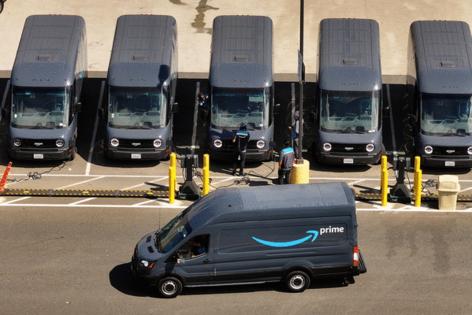Jane Fonda and other celebs demand that Amazon improve conditions for pregnant workers
Published in Business News
Jane Fonda, Cynthia Nixon, Sally Field and several other celebrities are demanding that Amazon address allegations that pregnant warehouse workers are not receiving reasonable accommodations, causing health complications and even miscarriages.
The Hollywood personalities, which include Lily Tomlin, Chelsea Handler, Rosario Dawson and Pamela Adlon, signed a letter sent Thursday to Edith Cooper, the chair of Amazon's leadership development and compensation committee.
The federal Pregnant Workers' Fairness Act, which went into effect in June 2023, requires employers to grant "reasonable accommodation" to an employee's limitations having to do with pregnancy, childbirth or related medical conditions. For warehouse workers, this means the company would have to allow pregnant workers to take additional, longer or more flexible breaks, accommodate requests for light duty or help with lifting or other manual labor and meet other reasonable requests.
The company said that it does meet reasonable requests.
However, the letter argues that Amazon is violating the law, saying several workers have shared stories about "being forced to work at a breakneck pace" while pregnant. Some have faced "severe health complications, miscarriages, and total loss of income with no ability to access parental leave benefits as Amazon workers are either terminated or quit due to their impossible circumstances," the letter said.
The letter was posted online on the website of Expose Amazon, an organization focused on sharing stories of warehouse employees' experiences with injuries and detailing working conditions.
Erica Smiley, the executive director of Jobs with Justice, said the organization and other groups have received nearly 150 accounts from current and former Amazon workers who faced difficult working conditions while pregnant, including having to climb ladders or do dangerous tasks even in later stages of pregnancy.
"When we were starting to talk to Amazon workers, we thought the big issue was going to be wages, and the fact that the issue is actually, 'We don't want to die or lose our children,' is shocking to us," said Smiley, whose group helped to organize the letter. "I thought I had lost my capacity for outrage, but this was just incredibly outrageous."
Ali Stephens, a director for the people, experience and technology department within Amazon's human resources team, told The Times on Tuesday that the vast majority of pregnancy-related accommodations the company receives are approved.
Examples of those accommodations include additional breaks and exceptions to policies, like one that requires specific employees to be required to drive powered industrial trucks. Pregnant employees can also ask to be seated while working.
If an employee identifies what they believe to be an unsafe work condition or sees that policies designed to protect employees are violated, they should report it immediately, Stephens said.
"Ensuring all our employees, including expectant mothers, feel safe and supported is extremely important to us," an Amazon spokesperson said in a statement. "We have comprehensive policies and programs for employees who may need accommodations or restricted work. We're committed to ensuring that they have the assistance they need to perform their jobs through our robust accommodation process."
Warehouse workers have reportedly been requesting a meeting with Cooper, to whom the letter is addressed, and Amazon's board of directors and vice president of safety since July 2024, according to the letter, but they've been unsuccessful.
The celebrity campaign comes just ahead of Prime Day, now a four-day long sitewide sale. The popular event is "a major cause of injuries" for warehouse workers in Amazon's facilities across the United States, according to a 2024 report by Sen. Bernie Sanders, former chair of the Senate Committee on Health, Education, Labor, and Pensions.
Amazon responded to the July report and the findings of an additional report published in December 2024 by saying they were both "wrong on the facts" and feature "selective, outdated information that lacks context and isn't grounded in reality."
From 2019 to 2024, Amazon's delivery speed has increased while injury rates have decreased, the company has said.
During those five years, the company's worldwide recordable incident rate, or how often an injury or illness occurs at work, improved by 34% and the worldwide lost time incident rate, or the number of injuries and illnesses that result in at least one day away from work, improved by 65%, according to a May proxy statement.
A shareholder proposal had requested that the board of directors commission an independent audit and report of the working conditions and treatment that Amazon warehouse workers face. The board rejected the ask, arguing that the company had already publicly disclosed its workforce incident rates and is already subject to regulatory oversight.
©2025 Los Angeles Times. Visit at latimes.com. Distributed by Tribune Content Agency, LLC.












Comments